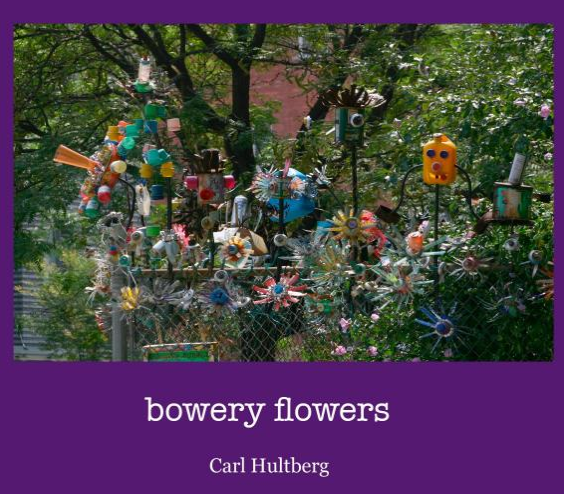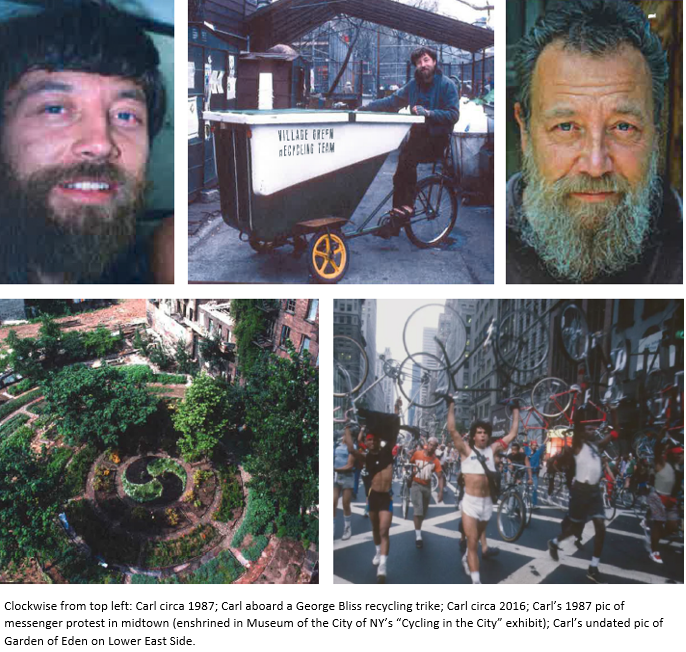Charles Komanoff revived Transportation Alternatives in the 1980s with his friend and inspiration Carl Hultberg. Hultberg died recently, and a memorial celebration of his life will take place Saturday evening on the Lower East Side. The following is Komanoff’s eulogy for this great, unsung New York figure. We regret that the many affirmative comments to this post were lost during a site makeover.
There are no photos showing the ramshackle stand at Bleecker and Broadway at which on sunny June weekdays in 1987 Carl Hultberg and I served up lemonade and our “safety code” flier to bicycle messengers. Also unphotographed is Carl’s and my earlier workshopping that launched our green-infused takeover of Transportation Alternatives, with me installed as board president and Carl as consigliere.
Nor are there pictures, save for those in my mind, of Carl’s richly cluttered East Fourth Street apartment where we swapped books and music, leafed through issues of the anarchist ’zine Processed World and debated messenger culture, bike culture, green culture. Under Carl’s tutelage, my sensibility evolved just enough that when City Hall decreed its Midtown bike ban — a crackdown Carl foretold in full — we made sure TA threw in with the messengers and led from behind.
Carl died in June, in his house outside the somewhat isolated New Hampshire town of Danbury where he moved a decade or so ago, after finally accepting his landlord’s buy-out. This Saturday evening, Carl’s pals Bill DiPaola, George Bliss, Chris Flash, Pogo (Bill Weinberg) and I are holding a memorial celebration on the Lower East Side. Info here. Everyone is invited.
As you can imagine, the run-up to the memorial has me pondering Carl and the past, with amazement and melancholy.
An intrepid photographer and compulsive documentarian, Carl was, as the saying goes, more comfortable behind the lens than in front of it. That was also true of his organizing. In the mid-eighties he saw that TA, where he’d been volunteering, was sputtering and due for a makeover ... and pushed me for frontman, insisting I had straight cred he lacked. Plus, Carl had more going on than just reclaiming streets from cars: there was composting, recycling, utility bikes, community gardens, feminism, anti-apartheid divestment, veganism, interspecies-ism and hemp, for starters.
All this while carrying the flame of his hipster-scholar grandfather, the jazz impresario and historian Rudi Blesh, who died in 1985 after years in Carl’s care. (My first time in that Fourth Street apartment, seeing cabinets bulging with Rudi’s ragtime 78’s, I blurted out an expression I’d heard on college radio: “Moldy Fig, eh?” Carl didn’t miss a beat: “My grandfather coined the phrase.”)
“I was recruited into TA,” I later recounted in my Bicycle Uprising series, “by Carl Hultberg, a Green activist with one foot in utopian movements and the other in TA.” Visionary currents drawn from Gandhi and King and Lennon and Coltrane kept Carl buoyant as he grounded himself in the grit of birthing an ecological city: turning an Allen wrench at a TA bike-repair clinic, balancing a front-end-loader utility trike on a recycling run, sorting bottles and cans at his Village Green depot next to the West Fourth Street basketball courts.
Carl was especially intent on fending off the Mayor Koch-era scapegoating of cyclists for the city’s traffic ills. That’s how we met — his NY Greens postcard mailer that landed in my mailbox talked of cyclists and pedestrians together pushing back against killer cars. Our lemonade stand at Bleecker and Broadway — “Free for Messengers” read his handmade sign — was Carl’s contrivance to draw messengers into conversation and plant the idea that their “sweatshop of the streets” could be a launch pad to humanize traffic rather than tyrannize pedestrians.
No fence hemmed in his thoughts. Retiming traffic lights to bicycling speed, Carl wrote in his 1986 City Cyclist manifesto Cycling to Safety, “would slow down motor and messenger traffic, allow cyclists to stop for lights without being unreasonably delayed, and give pedestrians more time to cross.” Peering into the future, he visualized that “eliminating parking on one side of every street and avenue would free up a lane for use as a bike or bus lane protected from encroachment by a barriered bike path where pedestrians would know to expect cyclists.”
As I wrote in Bicycle Uprising, the Midtown bike ban telescoped years’ worth of livable-streets organizing into weeks. TA’s volunteer base tripled and tripled again with writers, artists and layout designers who infused City Cyclist with verve and polish. Carl was less at the center but still present. One evening, as I was readying my chart of NYPD crash stats — numbers that we hoped could dispel cyclists’ bad rap as pedestrians’ menacers — he softly suggested changing my wonky heading, “NYC Traffic Accidents,” to the far more telling “Who’s Really Getting Hurt?”
That was Carl: don’t correct, suggest. Don’t twist the arm, just twinkle the eye. And cut to the chase.
In a few years both of us would rotate off the Trans Alt board. Carl went first, explaining that he had nothing left to teach me. That may have been the finest compliment I would ever get, until some years later, when the mail brought Carl’s first book of poetry, Bowery Flowers, I saw this (“o chief lark of man” is my name anagrammed):

o chief lark of man
green from the beginning
subtle calculator of change
modest through accomplishment
urban bike rider now not so strange
foresaw the slippery social shifts
crunching energy creating lanes
taking out the avenue with bikers
critical mass before the name
patient teacher to a slow learner
bike messenger computer class
got me thinking about my writing
here’s a new one does it pass
Yes, Carl, it does. xo.






